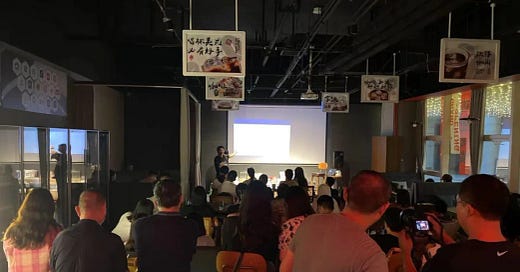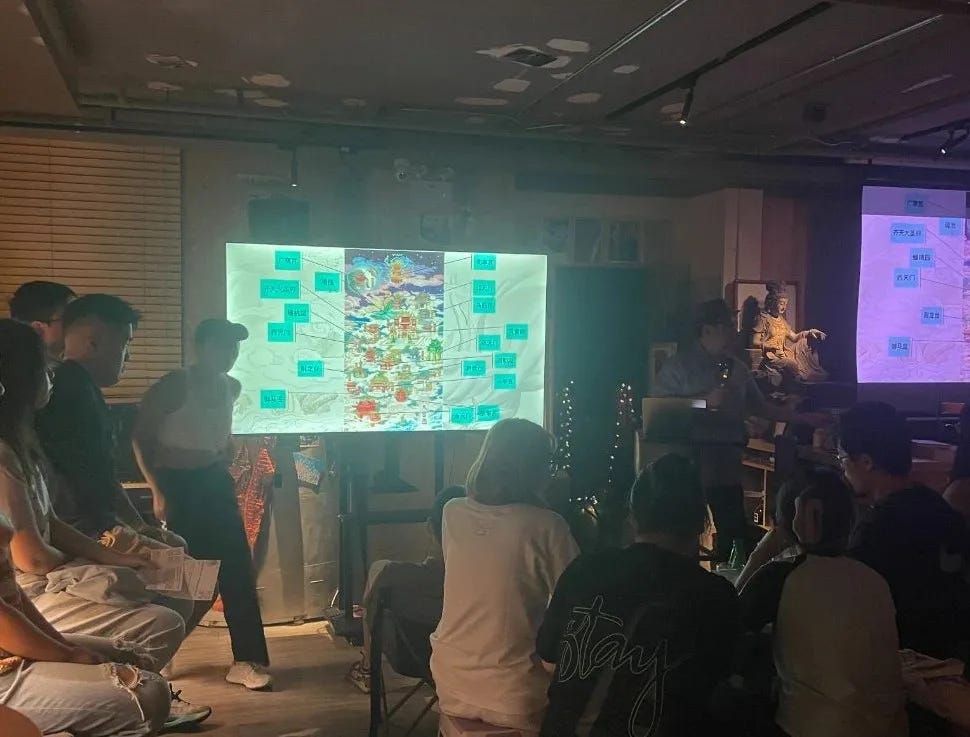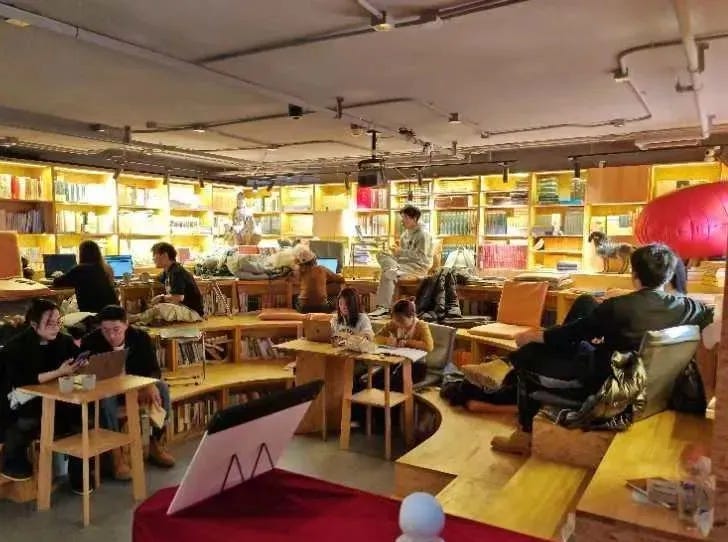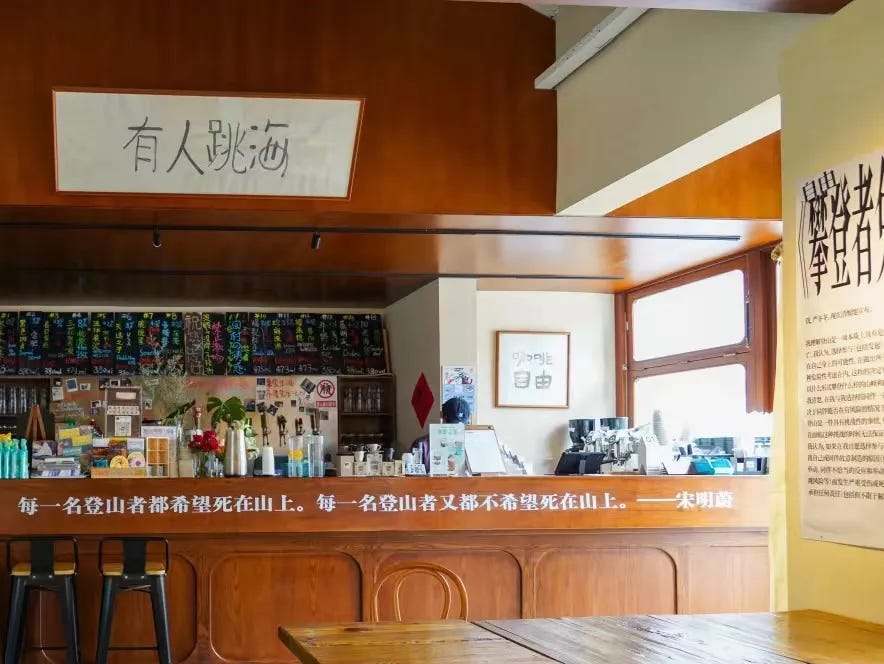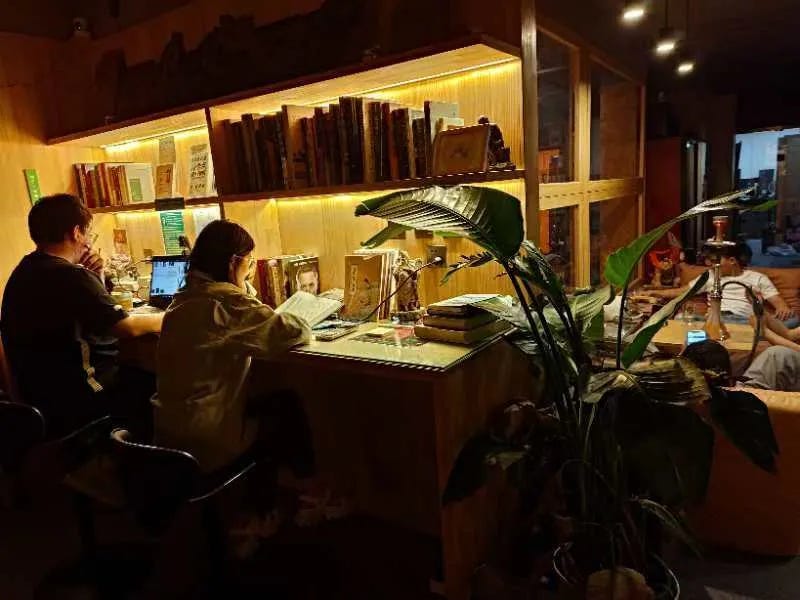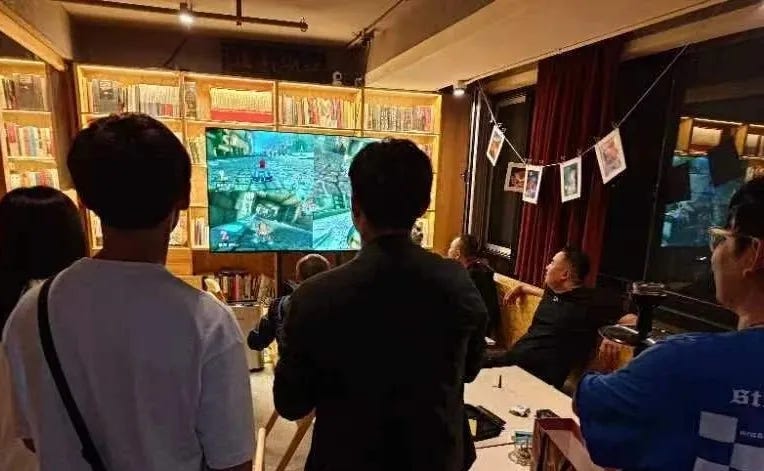Pop-up lectures in bars offer young Chinese a triple benefit: relaxation, learning, and socializing
When I graduated from university and joined an international accounting firm, one of my initial observations was the apparent scarcity of conversations around social or public issues. It was challenging to find people who were willing to engage deeply on public issues. Everyone is busy completing heavy workloads within limited time.
Reflecting on that time now, I realize it was a natural transition from student life into the professional world. As a member of society, one inevitably encounters a broader array of concerns compared to the relatively pressure-free and exploratory environment of university, where it was easy to find like-minded peers passionate about societal issues due to the curriculum's strong focus on such topics.
Today's newsletter discusses a popular trend emerging in several Chinese cities: academic lectures in bars. According to the individuals featured in this story, the relaxed atmosphere of bars partially offsets the seriousness of academic lectures, perfectly aligning with the current needs of many young people in China. This setting allows them to learn and unwind simultaneously, effectively combining two activities in one. Moreover, attending these science bar events evokes a sense of returning to campus life and participating in reading groups.
While still a trend, with most bars continuing their traditional operations, I find this phenomenon quite intriguing and worthy of attention. The article was first published on the WeChat blog of 每日人物 (Daily People), which focuses on individual stories amidst hot social topics. The original title of the article is 不唱歌、不蹦迪,年轻人沉迷在酒吧听课 Young People Swap Singing and Dancing for Classroom Sessions in Bars.
In the dim light, two large screens display PowerPoint slides as a teacher stands between them, microphone in hand, delivering a detailed lecture on the spiritual undertones and cultural symbols of Journey to the West, one of China's most beloved classics.
This scene may be common on a university lecture hall or a bookstore. But surprisingly, it's happening in a bar—and not as a one-off event, but as part of an ongoing series.
These bars, known online as "science bars," invite industry elites or university professors to lecture on their area of research, followed by a discussion with the audience. While this concept has long been popular abroad, it began to catch on in China in June 2024. Now they are emerging as the latest leisure trend among young people in first-tier cities like Beijing, Shanghai, Guangzhou, and Shenzhen.
Typically, there is an inherent conflict between the realm of science, which demands rigor and clarity, and the bar scene, which is often associated with carefree intoxication. Nonetheless, the blend of these two creates an inexplicable harmony.
Back at the bar, where the lecture on Journey to the West is underway, all the booths are occupied, with some even crowding into the spaces and lining the aisles, standing to listen.
A science bar hosting a lecture on Journey to the West (Photo by Meiri Renwu)
A girl exudes a fashionable vibe, her makeup delicate and her eyes sparkling with glitter. She is dressed in a spaghetti strap top paired with thigh-high boots, looking ready to hit the dance floor at any moment. Yet here she is, sitting upright at the bar, craning her neck through the crowd to lock eyes with the teacher.
Many have goblets on the table, sipping occasionally, but their focus remains sharp. They stay attentive, eyes fixed intently on the screen, even nodding along with the teacher's points.
It's not a formal lesson, though for those sitting in the front rows, playing with their phones seems like something they shouldn't do. If they do check their phones, they discreetly slide their phones under the table, hunch over, and take a quick look. Before looking up, they scan the room, and if they catch someone's eye, a flicker of embarrassment crosses their face, as if they've been caught in the act.
Sometimes, this "stealthy" act seems to bring an indescribable feeling of pleasure. In the second row, right across from the teacher, sits a PhD student from Peking University. She found out about the science bar event online and came with a friend to check it out. Whenever she's tempted to chat with her friend, she engages in an internal struggle, either covering her mouth or lowering her head. Her friend picks up on the cue and leans in, and they chat quietly, just like students passing notes in class.
The two, perhaps feeling that the experience of "sneakily" chatting in a bar is really funny, burst into laughter, but they must retain it. Their suppressed laughter turns into silent giggles, with air escaping through their noses in little "hmphs." As soon as their eyes meet, this clandestine suppression of laughter triggers another round of chuckles between them.
Before the lecture started, every attendee is given a piece of paper to take notes. Li Wanying (a pseudonym; same below) made full use of hers, writing down intriguing ideas. She also snapped pictures of the teacher's PowerPoint slides on her phone.
Notepaper handed out at a science bar event (Photo provided by the interviewee)
Li Wanying also stumbled upon the science bar event online while preparing to study abroad. She is applying for a master's degree in communication, noticing that the lecture topic is related to humanities and social sciences, decided to attend together with her friend.
At each class, there are always attentive students, but there are also those who get distracted—like me. To be honest, I'm not particularly interested in Journey to the West, and despite my best efforts to stay focused, I find myself drifting off. The flat tone of the teacher's voice, combined with the complexity of the technical terms, just serves as a distraction. Before I even notice, I've already yawned a few times.
Sitting by the bar counter, I appear to be at the intersection of two worlds. On one side, the teacher's lecture transports me back to my university days, while on the other side, the bartender's constant shaking of the cocktail shaker reminds me that I'm very much in a bar.
Class on one side and bar counter on the other (Photo provided by the interviewee)
In this setting, the things that are usually common in a bar instead bring a sense of shame. A couple sitting in the front-row booth illustrates this shift. After some hesitations, the boy tentatively placed his arm around the girl's waist, only for her to brush him off, saying, "Pay attention to the lecture." Embarrassed and flustered, he stroked the back of his head.
Each lecture usually includes a Q&A section, but time is limited, and not everyone gets a chance to ask a question. This leads to a queue of people waiting to add the teacher on WeChat or request a copy of the presentation slides. Well, it's hard to tell who is genuinely seeking advice from the teacher and who is simply going along with the crowd. I noticed one boy about to leave when his friend urged him to stay and join the line. Without thinking, he asked, "What are we doing this for?" but soon, as if fearing he'd miss out, he quietly lined up behind his friend, saying, "Might as well."
Zhao Yuancheng works on algorithms at an internet giant. In his free time, he also hung out with friends at bars, albeit without paying attention to the people around him. In his eyes, they were a blur.
But during bar lectures, he finds himself unconsciously observing others with great detail. His perception of these people becomes more distinct. For instance, someone carrying a Peking University tote bag is likely a student, whereas someone dressed in a T-shirt paired with leather shoes could be a financial professional.
Each lecture typically lasts about two hours. After it's over, the bar goes back to its usual state. As soft dance music begins to play, a couple tucks into the seats by the window. Once again, the air appears to have taken on a hazy quality, and the edges of reality begin to blur softly.
Science saves bars?
Jianing hosts a science bar in Beijing. He got the idea after noticing the buzz surrounding similar events in Shanghai on social media and thought, "This is something I should be doing." After finishing his postgraduate studies last year, he initially planned to pursue a PhD, but since all the supervisors he wanted to work with already had full rosters, he decided to take a gap year while waiting for his turn.
During his postgraduate years, Jianing frequently participated in reading sessions at school. Each time the event concluded, he and his classmates would continue their discussions in bars, energized by the conversation. To him, science bars are just the "social version" of those academic gatherings.
He seeks partnerships with bars, where they provide the venue and he takes charge of planning the lecture topics and inviting speakers. One of his partners is Liu Yuzhou, who runs a bar near Beijing's Wudaokou area, a hotspot for many top universities.
Liu Yuzhou works as a game script planner. A few years ago, he toyed with the idea of starting a brick-and-mortar business in the Wudaokou area since his friend has a storefront there, but he couldn't settle on what kind of business to open. Initially, he considered opening a bookstore, but the idea didn't seem promising after seeing established shops like Sanlian and Cenci bookstores relocate from the area. After much consideration, Liu Yuzhou decided to run a hybrid establishment: a coffee bar by day and a wine bar by night.
Last year, the bar officially opened. When he's not occupied with his day job, he checks in on the bar himself. He's noticed a trend where customers are spending less, with few receipts topping 100 yuan (about 14.17 U.S. dollars). Most people now order drinks in the tens of yuan range, with preferences leaning toward affordable options that still offer decent quality and can last for a while.
And there has been a shift in the bar's clientele. Last year, it was predominantly young couples. This year, however, the tables are often occupied by individuals who sit studying with their laptops or piles of books.
People studying at Liu Yuzhou's bar (Photo provided by the interviewee)
Liu Yuzhou envisioned his bar as a hub for cultural events, a concept he factored into store renovation. Anyone, including strangers, is welcome to come in, take a seat, and enjoy the facilities and music at their leisure.
Later, Liu Yuzhou partnered with Jianing to host several academic lectures. These lectures proved to be highly popular, with the aisles packed with attendees. The lectures are free to attend, and those who come pay for their own wine. Liu Yuzhou estimated that these events boosted his bar's revenue by about 30 percent.
At the same time, Jianing's social media presence also started gaining traction. Before each event, he would post updates, and the first post caught the attention of several hundred people. Soon, his follower count soared to thousands. Within three months, his account had amassed over 5,000 followers.
And as their events continue, more attendees are joining to their WeChat groups with each event. So far, they have set up seven WeChat groups, each of which has reached the maximum capacity.
Similarly, Xiangqian in Xi'an has also sniffed out business opportunities from the popularity of science bars in Shanghai. His friend runs a successful science bar in Shanghai, regularly hosting science-themed events that attract like-minded individuals. On its opening day, the bar packed to capacity. Convinced of the concept's potential, Xiangqian believed the idea must be viable in Xi'an too.
In June 2024, Xiangqian opened his own bar. From the start, he prioritized academic lectures. He had assumed that attendees would mainly come to unwind and not pay close attention to the lectures. To his astonishment, nearly 80 percent of them listened attentively, and a surprising 20 percent even took notes. He dubbed this unique learning method "tipsy studying."
Judging by the outcomes to date, the idea of science bars has indeed proven successful. Xiangqian has situated his bar near a stadium, far from the bustling bar districts. The slightly out-of-the-way location usually doesn't attract visitors. But once the academic events were introduced, the place was packed for nearly every session, often exceeding its capacity.
An academic lecture held at Xiangqian's bar (Photo provided by the interviewee)
Unlike in Beijing, Xiangqian charges a 68-yuan entry fee for its lectures, which includes a drink. Science bars have become so popular that his bar has been hosting more events in the past two months, with nearly one session on each weekday. This translates into a monthly turnover of between 100,000 yuan and 130,000 yuan.
For Xiangqian, the cost of running these academic lectures is minimal. Apart from the first event, where he invited a friend as the keynote speaker, all subsequent events have cost him nothing as scholars volunteer to speak. In fact, there are so many willing speakers now that some have to wait for available slots.
The busiest bar on the bar street stays open until 4 or 5 a.m. but only brings in 200,000 yuan or so a month. In contrast, Xiangqian's bar closes at 11 p.m. almost every day, yet its turnover is on track to match or surpass that figure.
Opening a science bar was a choice Xiangqian made after careful consideration. In February 2024, he had the idea of running a coffee bar by day and a wine bar by night. Then he spent three months visiting 107 coffee shops, where he chatted with each owner about their business over the past two years. In the end, he concluded that almost all physical coffeehouses and bars are struggling.
One coffee shop in a shopping mall had nearly rent-free conditions thanks to promotional incentives, yet it still only managed modest profits. The owner told Xiangqian that selling 70,000 cups of coffee a year yields a profit of just 100,000 yuan, and that figure would be even lower if rent were factored in. Moreover, the shop is the most profitable one in that business district.
Another coffeehouse is located in a scenic area, while benefiting from stable foot traffic, still only cleared just over 100,000 yuan annually, indicating that business wasn't booming even in such prime locations.
Despite their popularity, sustaining the success of science bars is no easy task.
A 2023 report on the consumption trends of online alcoholic drinks in China suggests that young people aged 18 to 35 prefer drinking at home or with meals, at rates of 60.2 percent and 45.2 percent, respectively. Given this, why would anyone need to go to a bar?
In China, 95 percent of bars are independently operated, rather than being part of a chain, which makes it difficult to find a universally applicable business model among them. In 2021, Helens International Holding, China’s largest pub chain, went public on the Hong Kong Stock Exchange, becoming the first pub chain to do so. This listing buoyed the optimism of some investors about the development of pubs. However, three years later, Helen's expansion has slowed, and its performance has declined.
Over the past several years, the most well-known bar chain brand is Tiaohai Village. Founded in 2019, Tiaohai Pub has expanded to more than 20 locations nationwide. With a wealth of events throughout the year and a community-focused approach, the pub has become a sanctuary for young city workers. For them, pubs are first and foremost a place for empathy and emotional value, and alcohol takes a backseat.
The interior of Tiaohai Pub (Photo courtesy of Tiaohai Pub)
In science bars, however, the emotional value comes not from the bar itself but from the events it hosts, including the topic and the keynote speaker. This means that to sustain a steady stream of patrons, science bars must continuously attract the right speakers.
For Jianing, selecting a good topic is the biggest challenge. The topic should be appropriate for the bar setting, innovative, and appealing to the public. Most importantly, he must identify the right scholar to present it.
Before each event, Jianing first chooses a broad category, like literature or philosophy, then narrows it down. In literature, for example, the event could focus on the Four Great Classical Novels of Chinese literature (Romance of the Three Kingdoms, Water Margin, Dream of the Red Chamber and Journey to the West). If these have been over-discussed, "Jin Ping Mei,"(The Plum in the Golden Vase) one of the greatest realist novels in Chinese literature, could be chosen instead. In philosophy, and more specifically in metaphysics, the ancient classic "Zhou Yi"(The Book of Changes) is a topic worth exploring.
The sense of gain in bars
To decide on lecture topics, Xiangqian often posts polls in his customer WeChat group, splitting the choices into categories such as psychology, literature, or career development. Each category offers several topics, yet psychology-related topics tend to win the vote almost every time.
In the daytime, Xiangqian is busy with his work at university. It is only at night that he can retreat behind the bar counter, where he mixes cocktails and brews coffee while enjoying some quiet time. He also overhears customers talking but doesn't retain much of their conversations. Still, the phrases he hears most frequently are along the lines of "I'm so exhausted; there is too much juan." (a term used to describe the relentless, often senseless competition many face in both work and life. Juan has become a ubiquitous term in everyday conversation, as a verb, a noun and an adjective)
Bars are meant to be places of relaxation, yet many customers come seeking knowledge, hoping to cope with the changes and uncertainties in their work and life.
Zhou Yufei's first job after graduating was at a publishing house in Shanghai. Amid a wave of layoff news, Zhou Yufei, who was assigned very simple tasks, often worried about being replaced by artificial intelligence (AI). In an attempt to avoid being laid off, she started taking on extra work, but her efforts were in vain. She ended up leaving after two weeks. The manager remarked that her mind was "too active" for the role.
Two months earlier, Zhou Yufei found a new job. The previous layoff experience has cast a shadow over her, making her especially grateful for the new job opportunity due to a lingering sense of insecurity. As a result, she tries to incorporate learning into almost all of her leisure activities after work.
That includes watching an opera directed by famous contemporary Chinese theatrical director Meng Jinghui, managing her own social media accounts, and attending several science bar events. "I really love the feeling of learning new things," she says. "It gives me a sense of stability and peace, as if the more I learn, the more secure I feel."
Relax and study at a bar (Photo provided by the interviewee)
Why are science bars popular with the young generation? The relaxing atmosphere at a bar offers a respite from the intense environment of academic lectures. This perfectly caters to the mindset of today's young people in China: I have no energy to juan, but I can't afford to lie flat (opting out of the rat race and doing the bare minimum in order to survive).
For a very long period of time, juan has been blended into the life of Zhao Yuancheng. From school to work, he has been conditioned to strive for upward mobility, albeit in different guises. At university, he attended lectures and participated in competitions for better grades; in the workplace, he enrolls in online courses to master the rules for career promotion and to improve his team communication skills.
Two years ago, Zhao Yuancheng suddenly felt lost, much like a spring that had been overstretched. He found himself pondering, "If we juan for a better life in the future, then at what point does the future begin?"
The external environment is changing, too, as the internet bubble is beginning to burst. The news is rife with stories of layoffs and plummeting stock prices. In the office, it appeared that resignation was an almost daily occurrence, with some returning to their hometowns and others leaving to take civil service exams for job security.
Zhao Yuancheng decided to put the brakes on his fast-paced lifestyle, yet he understood he couldn't stop learning altogether. Every employee in the tech industry is facing the "Crisis of 35" — the belief that white-collar workers confront unavoidable job insecurity after they hit that age. However, in reality, this anxiety is creeping down to younger ages, with concerns affecting those in their 30s and even late 20s. The only way to break free is to keep learning.
So for Zhao Yuancheng, a science bar is a perfect solution, allowing him to both learn and relax: "One event serves two purposes."
In a bookstore or café, he might feel like he's still "passively learning," but in the bar's more relaxed environment, he enjoys the freedom to "opt out of listening." The lecture transforms into a casual exchange where a stranger shares an interesting topic, shifting passive learning to an active experience.
It's also relaxing because no one is there to delve into complex academic theories, as evidenced by the range of topics in various science bars. At Xiangqian's bar, discussions span from financial investments to childhood traumas. They also keep up with the times. Following the release of the Chinese video game "Black Myth: Wukong" in August 2024, they introduced a session titled "An Informal Discussion on the Scenic Spots and Ancient Art of 'Black Myth: Wukong'."
More significantly, science bars enable attendees to gather together to discuss shared interests, thanks to the strong social atmosphere that bars naturally provide. Furthermore, the process of discussing academic topics, which raises the bar communication, helps people to connect with like-minded individuals in higher-quality conversations.
Young people communicating at a science bar (Photo provided by the interviewee)
After starting her career, Li Wanying found it difficult to have someone to talk about social issues or public affairs, let alone engage in deep, thought-provoking conversations on any given topic. Attending science bar events often brings her back to school, reminiscent of being part of a book club. She remembered a lecture on The Golden Lotus where both the speaker and the audience freely exchanged views on sex and love. It was then that she realized, "People can discuss sex without any judgment or discomfort."
Zhao Yuancheng has also become increasingly aware of his desire for intellectual stimulation. His job is demanding, with long hours, and the vast majority of his social interactions are work-related. He yearns for a clash of ideas to break away from routines.
Attending science bar events fulfills his purpose. He is selective about events, only participating in those that spark his interest, so everyone has a shared interest and has given the topic some thought beforehand.
These events provide Zhao Yuancheng with a sense of fulfillment amidst his hectic work schedule. "This intellectual harmony is like a recharge for my spirit." However, this form of social connection is delicate; once the event ends and everyone goes their separate ways, after that brief period of rejuvenation, Zhao Yuancheng inevitably returns to the demands of his job.

